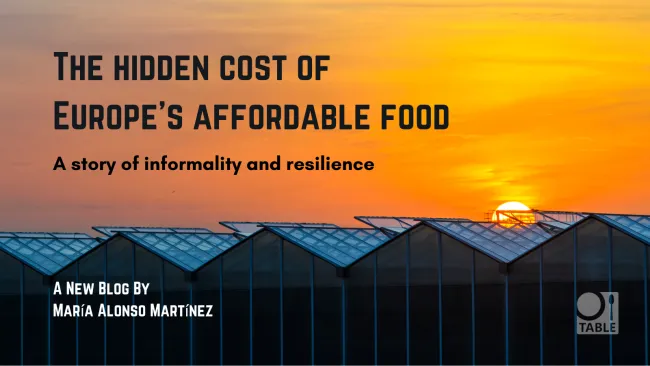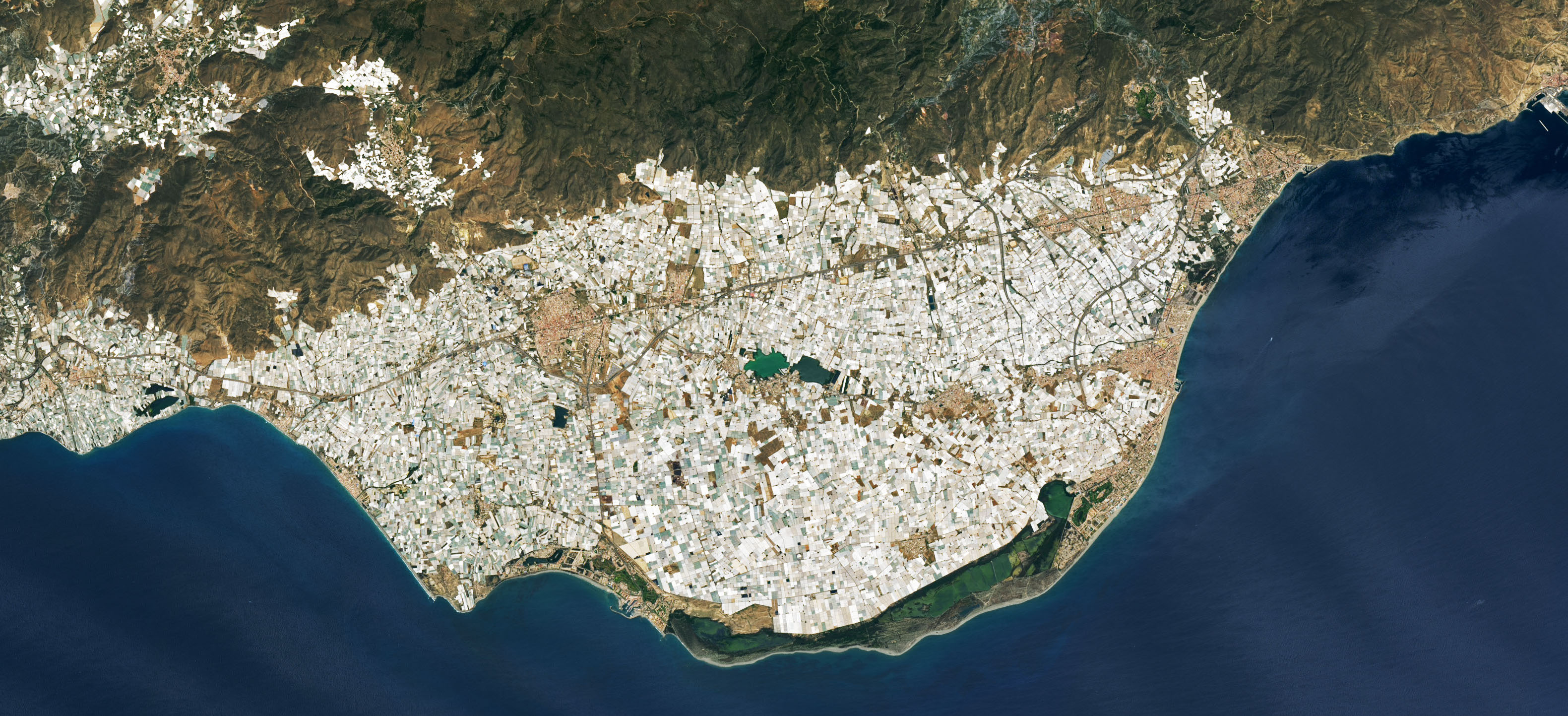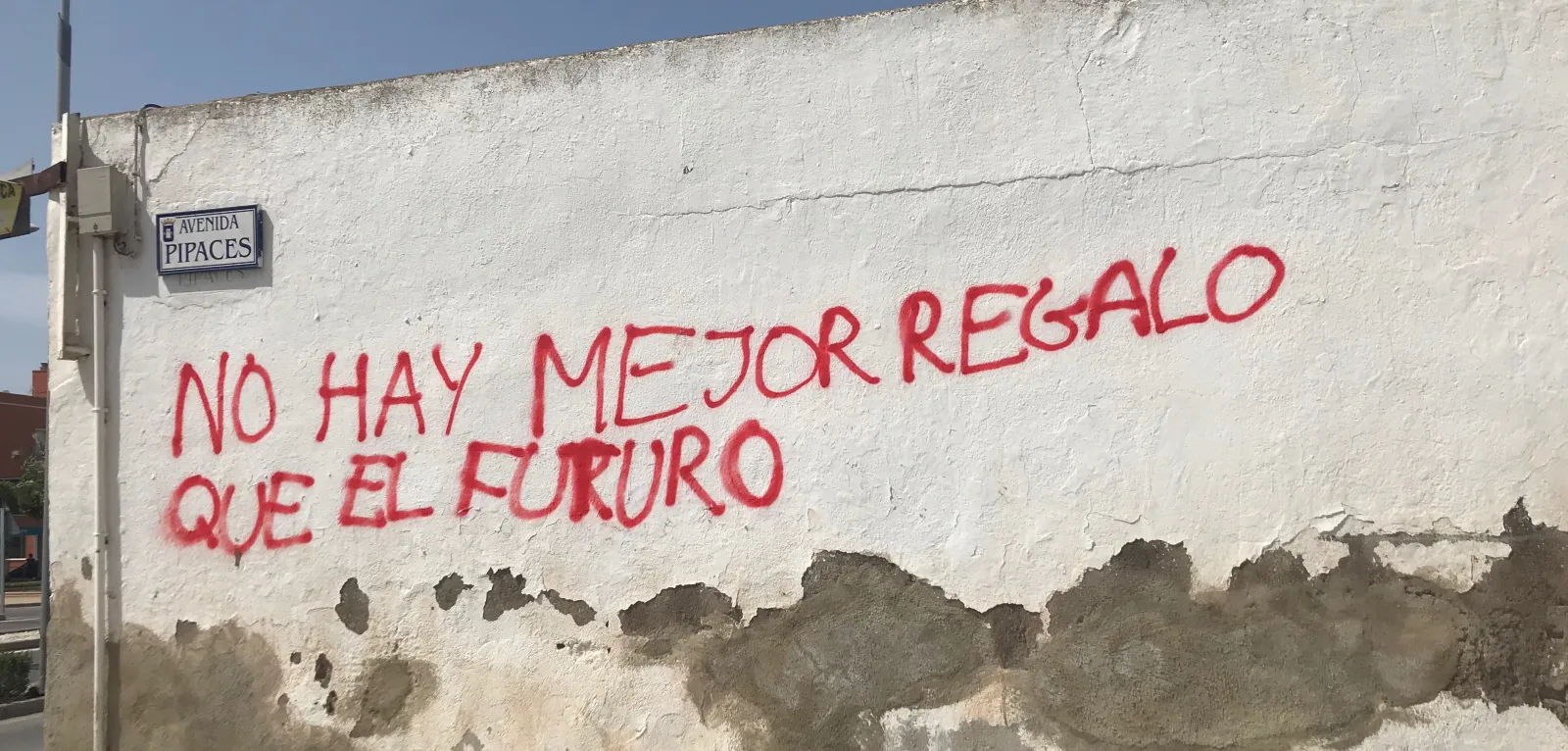Affordable food, particularly fresh produce, is a key feature of food system goals in the EU, but the provision of year-round fresh fruit and vegetables relies on a growing system that offers little stability to its workers. Researcher María Alonso Martínez asks what we can learn from the resilience of the workers in this community, and how to reconcile affordability with the precarity it seems to require. María Alonso Martínez is Junior Officer in Circular Development at the ICLEI World Secretariat. This research was carried out at Wageningen University & Research, Netherlands.

Almería – The vegetable garden of Europe
I was born in Almería, a city tucked into the southeastern corner of Spain, in the last kilometers of Europe. Now, after five years of living in the Netherlands and Germany, the North of Europe has become my home. Winter's chill can seem endless here, but there's a comforting constant at my local supermarket – the year-round availability of tomatoes and cucumbers, proudly labeled "Origin: Almería". Yet, with every purchase, I can’t help but reflect on the long journey behind these vegetables. My dinner is the product of the labour efforts of migrant food workers across Southern Europe who have become the backbone of Europe’s food security. The resourcefulness of this community, along with their vulnerable living and working conditions, has remained largely unnoticed for far too long. It demands a frank conversation about the role of informal work in the resilience of our food systems. As I delve deeper into my research, it has become evident that my journey has come full circle, leading me back to Almería, where the roots of our food system intertwine with the stories of those who cultivate its produce.

Almería’s Sea of Greenhouses, courtesy Earth Observatory NASA https://earthobservatory.nasa.gov/images/150070/almerias-sea-of-greenhouses
In Almería lies the world's largest concentration of commercial greenhouses, often referred to as ‘the sea of plastic’. This vast expanse of polytunnels, housing millions of kilos of fruits and vegetables mainly destined for export, stretches for hundreds of kilometers, a white panorama until the horizon. Also within this sea of plastic dwell the migrant workers who work to ensure Europe's supermarkets are stocked year-round. While they perform the vital task of ensuring Europe's all-season access to fresh produce, these workers often live in a state of physical and institutional vulnerability. This state of affairs remained largely hidden, until recent shocks like the Covid-19 pandemic and armed conflicts exposed the fragility of our food supply chains.
Beyond official numbers: the hidden cost of affordable food in the EU
Spain issues approximately 150,000 permits annually for seasonal laborers (European Parliament 2021). However, within just the province of Almería, there are more than 100,000 migrants working in greenhouses, 80% of them holding undocumented status in the country. This lack of legal recognition leaves the workers off official records, denying them universal rights such as labour rights and access to formal rental contracts. It is a dire situation that forces many to call the shanty towns surrounding the greenhouses their homes. During my research, I often heard how some workers pay up to 6,000 euros annually to greenhouse managers for the working contracts necessary to seek legal status in the country, turning the quest for legalization into a profitable business.
Almería serves as a primary entry point for migrants traveling from West and North African countries to Europe. For those who cross the Mediterranean without visas - the majority of greenhouse laborers - this work is virtually the only option for income generation on arrival. While informal greenhouse jobs provide financial support to workers and their families back in their home countries, they also perpetuate vulnerability in livelihoods and employment, highlighting and embedding a stark contrast between EU citizens enjoying affordable food and the undocumented migrant workers compelled to work in precarious conditions to provide it.
European food security relies on a resourceful but invisible workforce
The pursuit of affordable food in the European Union has inadvertently put vulnerable migrant and seasonal food workers at risk, compromising the strength of the EU's food system and the security of regional food supplies. The EU’s Farm to Fork strategy (European Commission 2020), a core component of the European Green Deal, aims to transform food systems for fairness, health, and environmental sustainability. It emphasizes the importance of a resilient system that can provide affordable food for everyone. Despite these goals, not-yet-citizens are often compelled to work in informal ways to make food affordable for those with established rights.
But it's crucial to recognize that migrant food workers are not merely vulnerable individuals; they play a pivotal role in shaping food systems. In facing these conditions, greenhouse workers tend to rely on informal food provisioning structures such as gifting and sharing, donations, direct purchases from farms, and street and market vendors; actions deemed informal in the West but mainstream in many of the workers’ home countries and carried with them into their new realities. In my fieldwork, I observed vegetable gardens in informal settlements featuring beans, carrots, and many other vegetables. This is in stark contrast to the highly regulated EU food system to which the workers contribute, dominated by capitalist enterprises adhering to strict food safety rules and primarily represented by supermarkets. By actively engaging in more informal practices, the workers are contributing to enabling the sustainable vision outlined in the Farm to Fork strategy. As the Strategy emphasizes, "we must accelerate our transition to a sustainable food system that safeguards food security and the environment while providing a living for farmers and fishers" (European Commission, 2020, p. 8). The informal iteration among migrant workers provides crucial support to the strength of our formal food system.
Worker harvesting a melon, image courtesy of first author
As migrant and seasonal food workers are central to food production in Europe, their role must be recognized in food policy. To achieve this, we must shift our focus from the macro view to the daily experiences of these workers. Despite structural pressures, greenhouse workers hold the agency to organize their own food security, often guided by non-capitalocentric values such as freshness, a connection to their homeland, support for fellow migrants, and independence; values that I personally wish were more present in our food choices nowadays. Their experiences challenge conventional notions of informality, and this concealed diversity and resilience could prove beneficial to our food system if properly recognized.
Informality: a double-edged sword in the EU food system
The discourse surrounding informality and the regularization of food work is intricately layered, defying the kind of simplistic, one-size-fits-all solution often advocated from a structuralist policy perspective. Many workers expressed in interviews that informality, even in precarious conditions, provides access to work and the means to send money to families back home. Paradoxically, it enables economic agency while perpetuating inequalities. The reliance on informal work methods prompts questions about whether formalization is a reliable solution to curb inequalities, potentially enabling access to better working and living conditions, or if informality may offer additional agency and resilience, diversifying the food system and serving as a source of income for undocumented workers supporting their families. In my view, both statements hold truth.
Acknowledging that informality is not a straightforwardly good or bad phenomenon is essential. Addressing informality effectively might involve, for instance, supporting the establishment of informal cooperatives and collectives for increased representation and bargaining power, investing in social safety nets and training opportunities for community empowerment, and promoting and upscaling local food practices that are sustainable. It is vital to further investigate the viable, inclusive policies that have the potential to foster the diverse and resilient benefits of informality, despite its current concealed state. By acknowledging the multifaceted nature of informality and implementing targeted interventions, we can leverage its strengths to construct a more inclusive and adaptive food system, benefiting both workers and the broader community.
As we navigate the transformation of our food systems, further exploration into the routines of migrant food workers becomes a critical first step. It must be acknowledged that our resilience, our year-round tomatoes and cucumbers, currently builds on vulnerability. And that considering all perspectives, especially those of non-citizen workers, is essential in reshaping our food system. This inclusive approach is essential to avoid unintended consequences from well-intentioned policies like the Farm to Fork Strategy. Simultaneously, the conversation about informality—what it is, for whom, and the implications of enabling/revoking it—needs to happen if we are to create a more inclusive, resilient and sustainable food system.
If you’re interested in further insights and discussion on the topic, please read our open-access article here: https://link.springer.com/article/10.1007/s10460-023-10513-8




Comments (0)